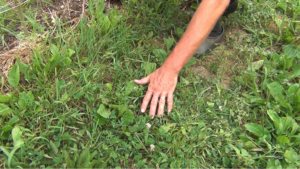Organic Wholesale Markets: Weeding
Managing Your Weeds
Weed management is a big part of growing organically. Crop rotation, laying down black plastic mulch, transplanting, and cover cropping, are all ways to help manage your weeds. All practices are topics that we cover in our online videos and blogs.
“…Knowing your crop as far as the ones that are most sensitive to the weeds and being prepared to take care of them is important.”
Richard Moyer
Proper weed management is key to having a profitable operation. It will help manage pests and diseases and will help produce healthy and stronger crops. Since there are no approved herbicides when growing organically and most inputs are preventative, it’s extremely important to get a handle on your weeds as early on as you can.
In our corresponding video, we start off by joining Richard Moyer in Russell County Virginia to discuss some small tools and the importance of weeding. Richard notes that it’s important to understand your crop and their sensitivity to weeds. For instance, onions will lose fifty percent of their size in the first few weeks if they’re shaded. Richard is using a Lucko Wire Weeder to comb through his beds and remove any young weeds. This tool is excellent for small-scale farmers in the beginning of the growing season.
Since this tool isn’t ideal for large-scale farmers, we next join Jason in Marion Virginia to discuss a Stirrup and a triangle Rogue Hoe. These two tools are perfect to use a couple of weeks after tilling when young fresh weeds are starting to emerge. As Jason advises, it’s just a smooth scraping of the surface to keep the integrity of the soil.
After getting your plants in the ground or even a few weeks after, it’s always a good idea to add another layer of compost to help build your soil organic matter, as well as covering up some smaller weeds.
When you’re making your plans for how to manage your weeds, remember to think outside the bed. You may be tempted to till the space in between but farmers have warned me that if the growing season experiences heavy rain, that tilled space of dirt can quickly turn into mud and will make harvesting & packaging a whole lot harder than it needs to be. I was also warned that just leaving this space untouched would attract pests and even more weeds.
If you’re not comfortable leaving it as sod and keeping it mowed, some other ways to manage this space are with leaves, plastic, mulching, or woodchips. Remember don’t use woodchips on the beds themselves since they are nutrient negative for the first three years. Lastly, you do have the option to use an organic herbicide to manage the weeds in these pathways. Weed Zap, Avenger Weed Killer, and Axxe can all be used for farmstead maintenance. In a future blog/episode, we will talk about first using preventive measures and how to get these products on your approved inputs list.
Derrick Von Kundra
